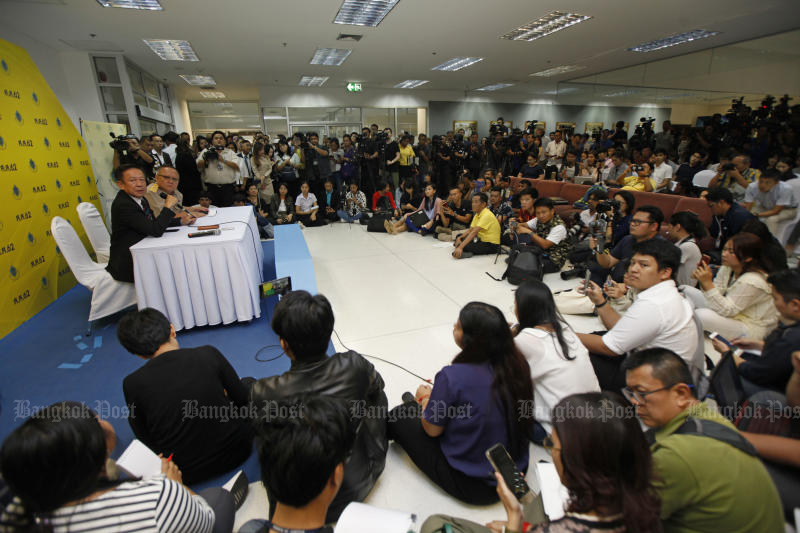
Academics have voiced concern over the rule of law in the kingdom in the wake of the controversial March 24 election as doubts have been cast about the ability of the Election Commission (EC) to oversee a free and fair poll.
If this proves beyond its means, it would not only undermine public confidence in Thailand's return to democracy but also damage the country's image in the eyes of the world, said Woothisarn Tanchai, secretary-general of King Prajadhipok's Institute.
"We would be willing to respect the result if the election had not been so problematic," he told a seminar in Bangkok yesterday marking Sanya Dharmasakti Day at Thammasat University in honour of the institute's eponymous late rector, who also served as a former prime minister.
"What I'm worried about now is a crisis of what is right according to the rules, but which is illegitimate," Mr Woothisarn added.
Other political scientists cited uncertainty over how the number of MP seats each political party will obtain are calculated, as well as other questions about the EC's performance.
Prinya Thaewanarumitkul, the university's vice-rector, said Thailand remains locked in a stalemate as it awaits two vote re-counts, six re-runs at ballot stations across the country, and the final results of how the party-list MPs will be distributed.
Critics have already blasted the system for calculating this as being overly complex, to the point that it risks sparking fresh disputes.
"According to the original formula, the anti-Prayut camp has 253 MP seats while the Palang Pracharath Party [PPRP] and the Action Coalition for Thailand Party (ACT) have won 123 MP seats," Mr Prinya said.
"However, the Constitution Drafting Committee [CDC] has proposed a second formula to the EC in which 11 small parties, which won fewer than 71,050 votes each on average, could pocket more seats at the expense of the bigger parties," he added.
The anti-Prayut camp refers to so-called pro-democracy parties that are vying to ensure incumbent Prime Minister Prayut Chan-o-cha, who rose to power five years ago in a coup, does not retain his grip on power.
Gen Prayut is a prime ministerial candidate of the PPRP. Pundits say he is the most likely to claim the top political seat after the official results are announced in May after His Majesty the King's coronation.
This, they say, is not only because his party pocketed the highest number of MP seats late last month, but also because the winning candidate will require the support of many of the 250 senators who have been handpicked by the current regime and are expected to remain loyal to it.
Asst Prof Prinya disagreed with the CDC's second formula because it would strip the leading parties of some of their seats, taking their cumulative total from 253 to 246, which he described as unfair. Conversely, he said it would ramp up the chances of the PPRP forming the next government.
"The EC's skewed interpretation would effectively turn the tables on the democratic camp and could lead to more political conflict," he noted.
In addition to the 500 MP seats that were up for grabs in the election, the 250 senators will have a major role in deciding who gets to run the country. A successful candidate would need at least 376 votes from the lower and the upper Houses combined.
"Even if his party fails to get 250 MPs, Gen Prayut will stay in power because of all the political cobras," he said, referring to defectors from other parties.
"If a new premier can't be chosen, he'll also win," Mr Prinya said, even if as a non-elected or "outsider" PM.
"I can't for sure whether those who drafted the constitution have deliberately caused problems in a bid to prolong Gen Prayut's stay in power," remarked Chulalongkorn University political scientist Surachart Bamrungsuk.
